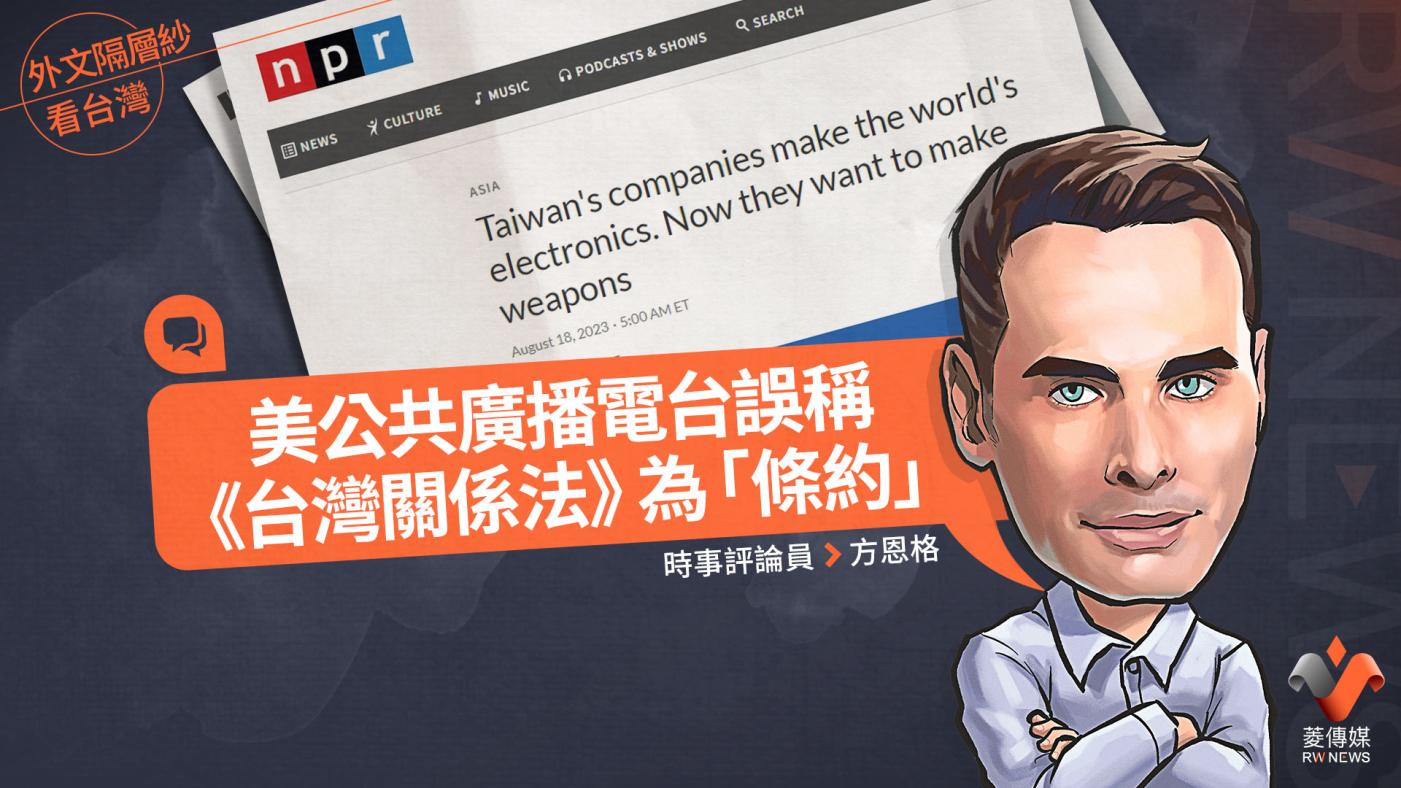![]()
![]()
方恩格/居台三十年美國人
今(2023)年8月23日,美國媒體全國公共廣播電台(National Public Radio,簡稱NPR)於其官網發布了一篇名為〈台灣企業為世界製造電子產品 現在他們想要生產武器〉的文章。
這篇文章是由NPR駐台記者馮哲芸撰寫。根據馮記者的個人簡介,在2019年加入NPR前,她曾在英國金融時報(Financial Times)工作,不僅曾派駐中國,她的新聞報導更是獲獎無數。
報導採訪了數家台灣公司,它們都有能力提供台灣軍方各類產品,包含無人機與供應給不同武器系統的鏡片。訪談內容提供了豐富資訊,她向讀者介紹了這些廠商具備向台灣軍方提供的能力。
然而,台灣軍方可能向台灣廠商採購更多產品,這在外媒中並不是一個新話題。以過去數年的報導為例,美聯社(Associated Press) 在2018年刊出〈在與北京緊張關係加劇之際 台灣熱衷於發展國防〉;台灣美國商會(American Chamber of Commerce in Taiwan)在2019年刊出〈台灣國防工業日益增加的困擾〉;美國之音(Voice of America)在2019年刊出〈認識台灣新興的軍事工業複合體〉;日經亞洲(Nikkei Asia)在2022年刊出〈美國與台灣就生產美國武器進行談判〉;馮哲芸也於今年7月,在NPR發表名為〈面對中國威脅 台灣公司轉向武器製造〉的文章。
今年五月美國軍工企業代表團訪台,同樣得到大量外媒報導。
遺憾的是,馮記者犯下了一個明顯錯誤,她寫下「美國簽署了項『條約』,要求它幫助台灣自我防禦以對抗中國,每年賣給台灣至少價值數億美元的武器及防禦系統,如F-16戰機」
這段話指向了《台灣關係法》。
《台灣關係法》是美國國內法,並非「條約」。事實上,當美國與中華民國斷交時,當時簽署的《中美共同防禦條約》也同樣失效。
雖然文章隨後做出修正,將《台灣關係法》改稱為「法案」。但對於如馮哲芸這樣資深的記者來說,最初描述《台灣關係法》為「條約」,仍是難以原諒的錯誤。這將誤導不熟悉《台灣關係法》或美台中三方關係細節的讀者。
她也寫到美國「每年賣給台灣至少價值數億美元的武器及防禦系統,如F-16戰機」。儘管這樣的說法在拜登及川普政府時期是準確的,但在不久前的歐巴馬與小布希政府時期,就不那樣準確了。
根據美台商業協會於去(2022)年12月28日公布的統計數據,2006年布希政府並未通知美國國會有任何的對台軍售;同樣在歐巴馬政府時期的2009、2012、2013、2014及2016年,也沒有通知國會有對台軍售。換句話說,有些年份美國並未販售武器或防禦系統給台灣。
一篇好的文章對於描述《台灣關係法》應更為精確,並就每年的美國對台軍售上提供更多資訊。此外,如果他們能夠採訪國防部,了解其對擴大國內軍事採購的意圖,那將會更清楚。
關於本專欄
方恩格曾任美國共和黨亞太區主席,旅居香港、新加坡等地,目前定居在台灣,並熱愛台灣這塊土地。他堅信國際間有關的台灣論述,應以最公正客觀的方式被書寫,無論這些外文論述的書寫立意原本是多麼良善,若是隔層紗看台灣、錯誤描述台灣的歷史脈絡,對台灣的國際地位可能會造成傷害。
他的《外文隔層紗看台灣》專欄,將鎖定值得探討、談台灣的英文文章,並對其內容做出反饋。
也歡迎讀者對他的文章提出反饋:[email protected]m
以下為英文版原文
![]()
![]()
On August 18, 2023, the United States National Public Radio website published an article titled “Taiwan's companies make the world's electronics. Now they want to make weapons”.
The article was authored by National Public Radio’s Taipei-based reporter Emily Feng. According to Emily Feng’s biography, she joined National Public Radio in 2019, and prior to that she worked for the Financial Times. She was previously based in China, and has won numerous awards for her reporting.
The article interviews several Taiwan companies that are capable of supplying various products to Taiwan’s military, including drones as well as lenses used in different types of weapons systems. The interviews with Taiwan companies is informative, as it introduces readers to some of the capabilities Taiwan companies have to supply Taiwan’s military.
However, the possibility that Taiwan’s military will purchase more products from Taiwan companies is not an original topic in the foreign language media. Examples in recent years include in 2018 by the Associated Press “Taiwan keen to boost domestic defence industry amid rising tension with Beijing”, in 2019 by the American Chamber of Commerce in Taiwan “Growing Pains in Taiwan’s Defense Sector”, in 2019 by Voice of America “Meet the New Military-Industrial Complex in Taiwan”, in 2022 by Nikkei Asia “U.S. in talks with Taiwan to coproduce American weapons”, and in 2023 by National Public Radio “Facing threats from China, companies in Taiwan turn to weapons manufacturing”.
The visit to Taiwan in May this year by a delegation of U.S. defense manufacturers also received significant foreign language media coverage.
Unfortunately, Emily Feng makes a significant mistake when she writes “The U.S. signed a treaty requiring it to help Taiwan defend itself against China, and it sells at least hundreds of millions of dollars of weapons and defense systems like F-16 fighter jets to Taiwan each year.”
This sentence has a link to the Taiwan Relations Act.
The Taiwan Relations Act is a domestic US law and is not a treaty. In fact, when the United States terminated diplomatic relations with the Republic of China, it also terminated the Sino-American Mutual Defense Treaty.
Although the article was subsequently revised to describe the Taiwan Relations Act as “legislation”, initially describing it as a “treaty’ is an inexcusable mistake by a journalist as experienced as Emily Feng. It misled readers outside Taiwan who are unfamiliar with the Taiwan Relations Act, or the details of US-Taiwan-China relations.
Emily Feng also writes that the United States “sells at least hundreds of millions of dollars of weapons and defense systems like F-16 fighter jets to Taiwan each year”. Although this statement is accurate for the Biden Administration and the Trump Administration, not long ago during the Obama Administration and Bush Administration it would be inaccurate.
According to public information maintained by the US-Taiwan Business Council, the Bush Administration did not notify the United States Congress of any arms sales to Taiwan in 2006, nor did the Obama Administration in 2009, 2012, 2013, 2014 or 2016. In other words, in some years the United States sells no weapons or defense systems to Taiwan.
A better article would accurately describe the Taiwan Relations Act, and would provide more in describing annual U.S. weapons sales to Taiwan. In addition, it would have been helpful if the Ministry of National Defense was interviewed about its intentions to expand domestic procurement.
About the Author
Ross Feingold previously served as Republicans Abroad Asia Chairman, and he has resided in Hong Kong, Singapore. His love for Taiwan led him to become a permanent resident. Ross strongly believes foreign language commentary about Taiwan should be fair and objective, and no matter how well-intentioned, it is harmful to Taiwan when such materials lack context, or are factually inaccurate.
The “On Foreign Language Materials About Taiwan” column explores foreign language materials about Taiwan and provides feedback on their content. Email tips or feedback about this column to: [email protected]






